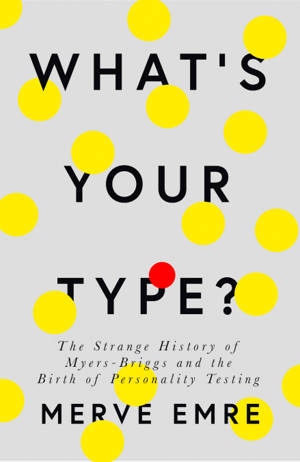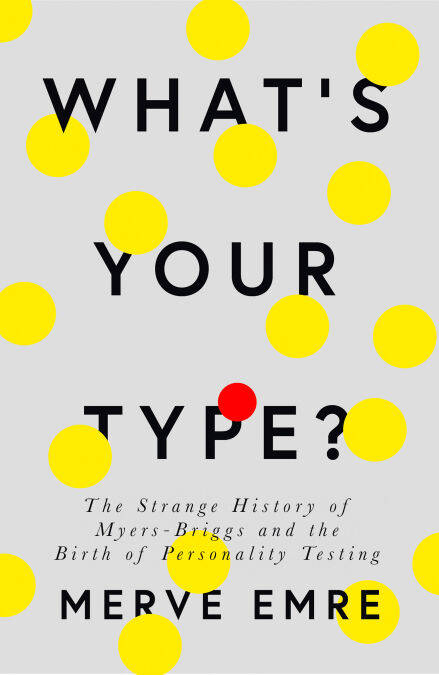
- Afhalen na 1 uur in een winkel met voorraad
- Gratis thuislevering in België vanaf € 30
- Ruim aanbod met 7 miljoen producten
- Afhalen na 1 uur in een winkel met voorraad
- Gratis thuislevering in België vanaf € 30
- Ruim aanbod met 7 miljoen producten
Zoeken
What’s Your Type? E-BOOK
The Strange History of Myers-Briggs and the Birth of Personality Testing
Merve Emre
E-book | Engels
€ 8,99
+ 8 punten
Uitvoering
Omschrijving
A SPECTATOR BOOK OF THE YEAR
‘History that reads like biography that reads like a novel – a fluid narrative that defies expectations and plays against type’ New York Times
‘Brilliant and savage’ Philip Hensher
An unprecedented history of the personality test conceived a century ago by a mother and her daughter – fiction writers with no formal training in psychology – and how it insinuated itself into our boardrooms, classrooms, and beyond.
The Myers-Briggs Type Indicator is the most popular personality test in the world. It has been harnessed by Fortune 100 companies, universities, hospitals, churches, and the military. Its language – of extraversion vs. introversion, thinking vs. feeling – has inspired online dating platforms and Buzzfeed quizzes alike. And yet despite the test's widespread adoption, experts in the field of psychometric testing, a $500 million industry, struggle to account for its success – no less validate its results. How did the Myers-Briggs insinuate itself into our jobs, our relationships, our internet, our lives?
First conceived in the 1920s by the mother-daughter team of Katherine Briggs and Isabel Briggs Myers, a pair of aspiring novelists and devoted homemakers, the Myers-Briggs was designed to bring the gospel of Carl Jung to the masses. But it would take on a life of its own, reaching from the smoke-filled boardrooms of mid-century New York to Berkeley, California, where it was honed against some of the 20th century's greatest creative minds. It would travel across the world to London, Zurich, Cape Town, Melbourne, and Tokyo; to elementary schools, nunneries, wellness retreats, and the closed-door corporate training sessions of today.
Drawing from original reporting and never-before-published documents, What’s Your Type? examines nothing less than the definition of the self – our attempts to grasp, categorise and quantify our personalities. Surprising and absorbing, the book, like the test at its heart, considers the timeless question: What makes you you?
‘History that reads like biography that reads like a novel – a fluid narrative that defies expectations and plays against type’ New York Times
‘Brilliant and savage’ Philip Hensher
An unprecedented history of the personality test conceived a century ago by a mother and her daughter – fiction writers with no formal training in psychology – and how it insinuated itself into our boardrooms, classrooms, and beyond.
The Myers-Briggs Type Indicator is the most popular personality test in the world. It has been harnessed by Fortune 100 companies, universities, hospitals, churches, and the military. Its language – of extraversion vs. introversion, thinking vs. feeling – has inspired online dating platforms and Buzzfeed quizzes alike. And yet despite the test's widespread adoption, experts in the field of psychometric testing, a $500 million industry, struggle to account for its success – no less validate its results. How did the Myers-Briggs insinuate itself into our jobs, our relationships, our internet, our lives?
First conceived in the 1920s by the mother-daughter team of Katherine Briggs and Isabel Briggs Myers, a pair of aspiring novelists and devoted homemakers, the Myers-Briggs was designed to bring the gospel of Carl Jung to the masses. But it would take on a life of its own, reaching from the smoke-filled boardrooms of mid-century New York to Berkeley, California, where it was honed against some of the 20th century's greatest creative minds. It would travel across the world to London, Zurich, Cape Town, Melbourne, and Tokyo; to elementary schools, nunneries, wellness retreats, and the closed-door corporate training sessions of today.
Drawing from original reporting and never-before-published documents, What’s Your Type? examines nothing less than the definition of the self – our attempts to grasp, categorise and quantify our personalities. Surprising and absorbing, the book, like the test at its heart, considers the timeless question: What makes you you?
Specificaties
Betrokkenen
- Auteur(s):
- Uitgeverij:
Inhoud
- Aantal bladzijden:
- 336
- Taal:
- Engels
Eigenschappen
- Productcode (EAN):
- 9780008201395
- Verschijningsdatum:
- 10/09/2018
- Uitvoering:
- E-book
- Beveiligd met:
- Adobe DRM
- Formaat:
- ePub

Alleen bij Standaard Boekhandel
+ 8 punten op je klantenkaart van Standaard Boekhandel
Beoordelingen
We publiceren alleen reviews die voldoen aan de voorwaarden voor reviews. Bekijk onze voorwaarden voor reviews.








